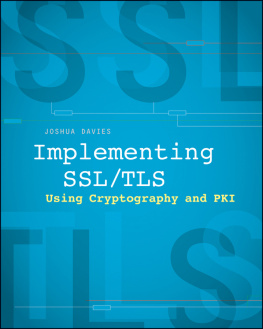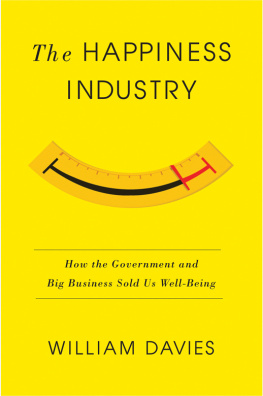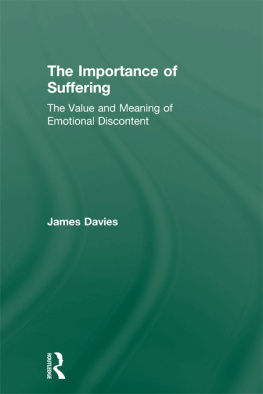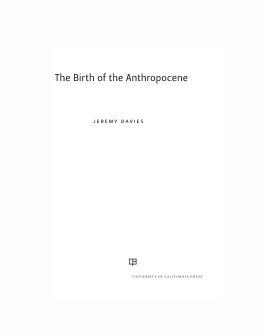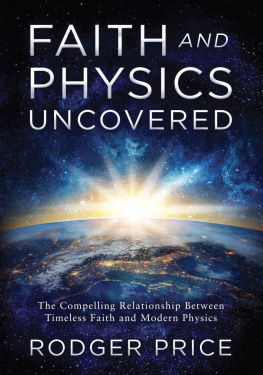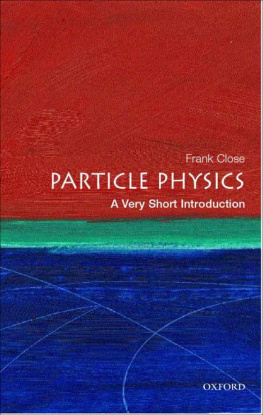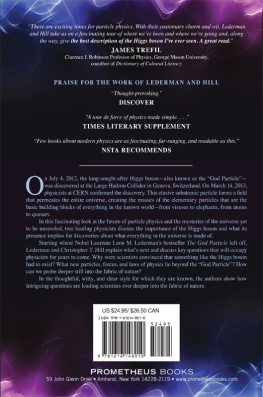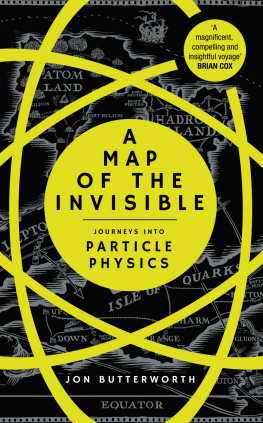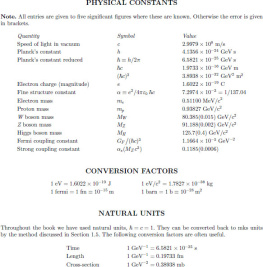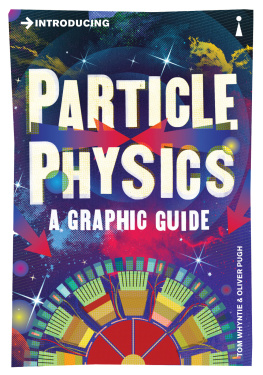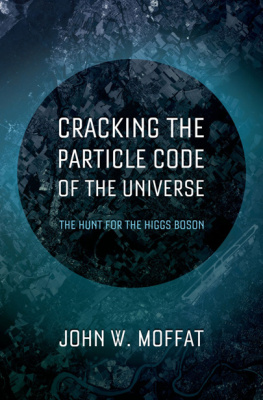Title page
God versus Particle Physics
A No-Score Draw
A Psychological Analysis of Theories about Life, the Universe, and Everything
J.B. Davies
Copyright page
Copyright John B. Davies, 2013
The moral rights of the authors have been asserted.
No part of this publication may be reproduced in any form without permission, except for the quotation of brief passages in criticism and discussion.
Originally published in the UK by
Imprint Academic, PO Box 200, Exeter EX5 5YX, UK
Originally distributed in the USA by
Ingram Book Company,
One Ingram Blvd., La Vergne, TN 37086, USA
2013 digital version by Andrews UK Limited
www.andrewsuk.com
Chapter 1: Prologue
For those who believe, no proof is necessary. For those who dont believe, no proof is possible. Stuart Chase, 1888
The above quote is normally viewed as applying primarily to religious belief systems. However, it cuts both ways. Certain kinds of science regularly feature in the popular media. In particular, contemporary theories of physics about how the world works, how the universe hangs together, and what stuff is made of are often to the forefront in this process. As a result, most of us are familiar with such things as black holes, super-colliders, dark matter, dark energy, and the Big Bang as a consequence of the ways in which these things are represented to us. This book is primarily about those representations and the ways in which they differ from, and also resemble, the alternative Creation myths of religious doctrine.
Most of us glean our understandings of the physical sciences from what we see on television, read in the papers, or read about in popular science books. These accounts are generally produced by scientists who seek to encourage a greater understanding of science amongst the lay public, and in some cases it is their explicit job to do so. My own understanding of physical science comes largely from these sources, so this book is also a comment on how good a job the scientists have done. For example, my assumption until recently has always been that these types of accounts describe some state of agreed scientific knowledge about how life, the universe, and everything really works. It is a surprise, then, to find that the accounts turn out to be increasingly speculative, inconsistent, and sometimes mutually contradictory. So this book is also about the inconsistencies and contradictions in scientists attempts to explain to the rest of us what they do, and how the universe works.
Scientists regularly undertake the task of communicating their science to the general public. Professor Richard Dawkins, for example, until 2008 was Oxford Universitys Professor for the Public Understanding of Science, and did a wonderful job of explaining the theory of evolution to a broad audience, and at the same time contrasting that theory with the tenets of religious belief from a broadly rationalist perspective.
However, religion and science are perhaps not the polar opposites we assume them to be. Religious belief has an explicitly moral basis, but the moral basis for science, while not absent, takes a bit more looking for given its supposed no-nonsense and objective basis. Bearing in mind that the word moral varies cross-culturally, with moral codes ranging from those that seem sublimely self-effacing through to those that are openly barbaric, religious dogmas seem generally to attempt to answer the questions Why did it all happen, and why are we here? In contrast, scientific thinking seems to focus more on a different pair of questions, namely How did it all happen, and how do we come to be here? In other words, theres a why question and theres a how question.
As a boy, I read books that my father bought as part of his desire to educate himself; he had a whole selection of books from the Everyman series. These were cheap little books in reddish-buff covers, with a picture of Rodins sculpture The Thinker on the spines, which had the laudable aim of bringing enlightenment, rationality, and basic scientific understanding to working men and women at a price they could afford. There were books on a variety of topics, including one on basic physics, and how it stood in opposition to the concepts of heaven and hell. I believe Robert Ingersoll may have been the author. The arguments were maybe a bit simplistic by modern philosophical standards, but included the argument that if heaven was up in the sky somewhere, it was strange that it was nowhere to be found; that the existence of an invisible superbeing who could attend to and act on every word that was said to him was highly unlikely, and in any case, where was he; that natural events had natural rather than supernatural antecedents; and ending with the Enlightenment idea of a forthcoming golden age when all frontiers of knowledge would fall before the glorious alliance of free-thinking and science, leaving metaphysical explanation unnecessary.
Probably because of these early experiences, I dismiss any literal God solution to the why question out of hand. Perhaps there is no why question to answer with respect to life and the universe, and if that is the case then only scientific theories have any value with regard to explaining reality. I do find this a bit disappointing, however. It is after all a bit of a let-down if the only purpose behind the universe is its own existence, and the only point of human life is to hang around for a while and then die, but there it is. It is not without a measure of disappointment, then, that I focus on the how question, and look to science in its various forms to at least provide a decent answer to that question.
But these days I have a problem. The basis on which I dismiss God, Heaven, Hell, and the miracles of the Bible is that they make no sense in terms of what I can see and observe. They are not rational, flying as they do in the face of the laws of nature. Water into wine? Not possible. Feeding a massive throng with a loaf and some small fish? Not possible. I cannot, in these instances, envision any way in which such events could happen. The senses of vision, hearing, taste, smell, and touch are my only routes to accessing the reality of the world (whatever it is) and thus are my only routes to rational, verifiable, and applicable knowledge about that world. From that basis, it seems unreasonable to accept the idea that, once we get to Jesus, the saints, and other miracle workers, all is explained by the simple assertion that the laws of physics simply dont apply at that point; that they break down where these people and events are concerned. That is just too easy and convenient to say, and amounts to asking me to abandon my rationalist belief system at that point.
But then a bigger problem arises. Modern physics offers explanations of how the universe was born out of the Big Bang, describes the properties of black holes, notes how subatomic particles can apparently be in two places at the same time, explains how dark matter binds the whole thing together, and many other wonders. But these things do not speak for themselves; they have to be described in words or symbols, and it is people who decide what words and symbols shall be used and what shall be described or not described. Put rather more simply, it is extremely easy for both priests and physicists to use words to describe the impossible. The danger then arises that the impossible thing described in words only starts to take on the form of reality, and people start to think it actually exists because, after all, theyve just described it. And that is a psychological, not a physics, problem.
It is primarily because of this glitch in logical thinking that the conclusions arrived at by some contemporary physicists are so strange just as they apparently do in the Bible.
But that is not an explanation. Stating that at some point a long-favoured explanation is no longer valid is clearly a failure of an explanation. If you took your car to the garage and asked the automobile-physicist, or mechanic as we call them, to explain why it wouldnt go, and he/she said The problem with your car is that none of the available theories of why cars dont go apply in this case, you would be less than impressed. And if such a pseudo-explanation wont do for Jesus and car mechanics, then from any reasonable perspective it wont do for scientists either. Being a physicist does not endow a person with an inherent right to be believed where others, on similar grounds, are disbelieved. It is not clear that physicists, and physicists alone, have the right to decide where the laws of physics shall, and shall not, apply.
Next page

